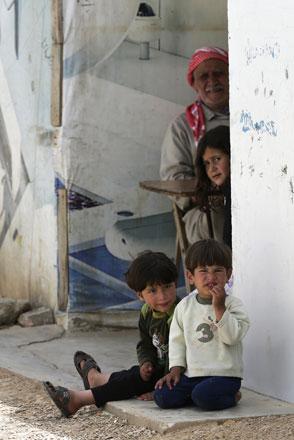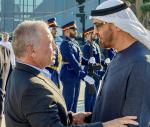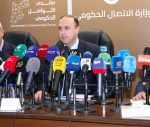LONDON/ATHENS — Syrian officials could face war crimes charges based on photographs from a defector proving the “industrial scale” torture and killing of 11,000 detainees by the regime, international prosecutors say.
Evidence smuggled out by a former Syrian military police photographer was reminiscent of the conditions in the death camps in Nazi Germany in World War II, the three investigators said.
A report by the prosecutors — commissioned by Qatar, which backs the Syrian rebels — provides “clear evidence” of the starvation, strangulation and beating of detainees in President Bashar Assad’s prisons.
The release of the report, which was first revealed by The Guardian newspaper, CNN and Turkey’s Anatolia news agency, came a day before talks were due to begin in Geneva aimed at negotiating an end to Syria’s bloody civil war.
“There is clear evidence, capable of being believed by a tribunal of fact in a court of law, of systematic torture and killing of detained persons by the agents of the Syrian government,” the report said.
“Such evidence would support findings of crimes against humanity against the current Syrian regime. Such evidence could also support findings of war crimes against the current Syrian regime.”
Syria has previously denied torturing detainees but the government had no immediate reaction to the report.
British Foreign Secretary William Hague said the report “offers further evidence of the systematic violence and brutality being visited upon the people of Syria by the Assad regime”.
The report was written by Desmond de Silva, former chief prosecutor of the special court for Sierra Leone; Geoffrey Nice, the former lead prosecutor in the trial of former Yugoslavian president Slobodan Milosevic; and David Crane, who indicted Liberian president Charles Taylor.
It also features testimony from a forensic pathologist, an anthropologist who investigated mass graves in Kosovo and an expert in digital images.
‘Pictures of emaciated bodies’
The defector, identified only as “Caesar” for his own safety, presented forensic experts commissioned by a London legal firm representing Qatar with around 55,000 digital images of 11,000 dead detainees since the start of the uprising in Syria in March 2011. The images were on memory sticks.
He claims the victims all died in captivity before being taken to a military hospital to be photographed.
De Silva said the report was the “smoking gun” showing evidence of “industrial-scale” killing by the Syrian regime.
“The pictures of emaciated bodies are reminiscent of the sort of pictures one saw after the World War II when the Nazi concentration camps were opened,” he told the BBC.
“The pictures show over a period of years the systematic murder of detainees by starvation, by torture, the gouging out of eyes, the hideous beating of people, the mutilation of bodies.”
The report says that all but one of the victims were male. Most appeared to be aged between 20 and 40.
The defector photographed as many as 50 bodies a day, the report said.
He said the purpose of the photos was firstly to be able to issue death certificates — falsely saying that the victims had died in hospital — and secondly to confirm to the regime that executions had been carried out.
The bodies would then be buried in rural areas.
‘He couldn’t take it anymore’
The authors of the report said they found the informant and his evidence to be credible after subjecting them to “rigorous scrutiny” and have made their findings available to the United Nations, governments and human rights groups.
The defector, who said he had never witnessed any executions himself, later escaped from Syria fearing for the safety of his family.
“There came a point a few months ago where he decided that he couldn’t take it anymore, so he decided to defect and he left. He could well have gone to Qatar, yes,” said De Silva.
Sunni-ruled Qatar was quick to back rebels who rose up in 2011 against the rule of Assad, who is backed by Shia powerhouse Iran.
Crane called the evidence “amazing”.
“This is the first provable, direct evidence of what has happened to at least 11,000 human beings who have been tortured and executed and apparently disposed of,” he said.
Syrian delegation to peace talks blocked
A plane carrying the Syrian delegation to crucial peace talks in Switzerland finally took off from Athens after being blocked there for hours Tuesday, according to AFP reporters at the airport.
The plane took off from the Greek capital at 5:05pm (1505 GMT), just over five hours after touching down at the airport.
An official Syrian source said Greek authorities had been refusing to refuel the plane, while a Greek civil aviation spokesman said it was being inspected and that a flight plan had not been submitted.
Syrian state television said the delay could lead to the cancellation of meetings, including one between Syrian Foreign Minister Walid Mouallem and UN Secretary General Ban Ki-moon.
The Syrian source said the plane had been blocked “because the Greek authorities refuse to provide it with fuel”.
It was not immediately clear why the plane — a mid-sized Tupolev, according to AFP reporters — would have needed to stop in Athens for refuelling.
In Athens, a civil aviation spokesman confirmed to AFP that the plane, which airport authorities described as “a Syrian Air charter”, had been blocked.
Foreign ministry spokesman Konstantinos Koutras said it was a “procedural” matter.
“The problem stemmed from the refusal of two private companies to refuel the plane owing to the embargo” against the Syrian regime, another foreign ministry source said.
“Following steps taken by the foreign ministry, the problem was solved,” he added.
The so-called Geneva II conference begins on Wednesday in the Swiss lakeside city of Montreux, where representatives from nearly 40 regional and world powers will be seeking a way out of the nearly three-year Syria crisis.
Those meetings will be followed on Friday by direct talks in Geneva between representatives of the opposition and of Assad’s regime, which, according to a Russian official, could last seven to 10 days.















